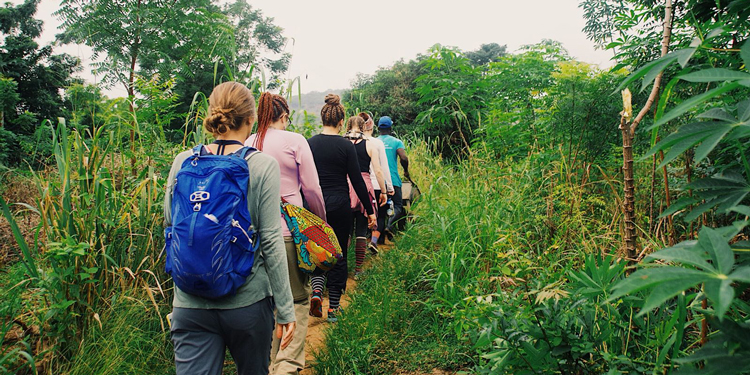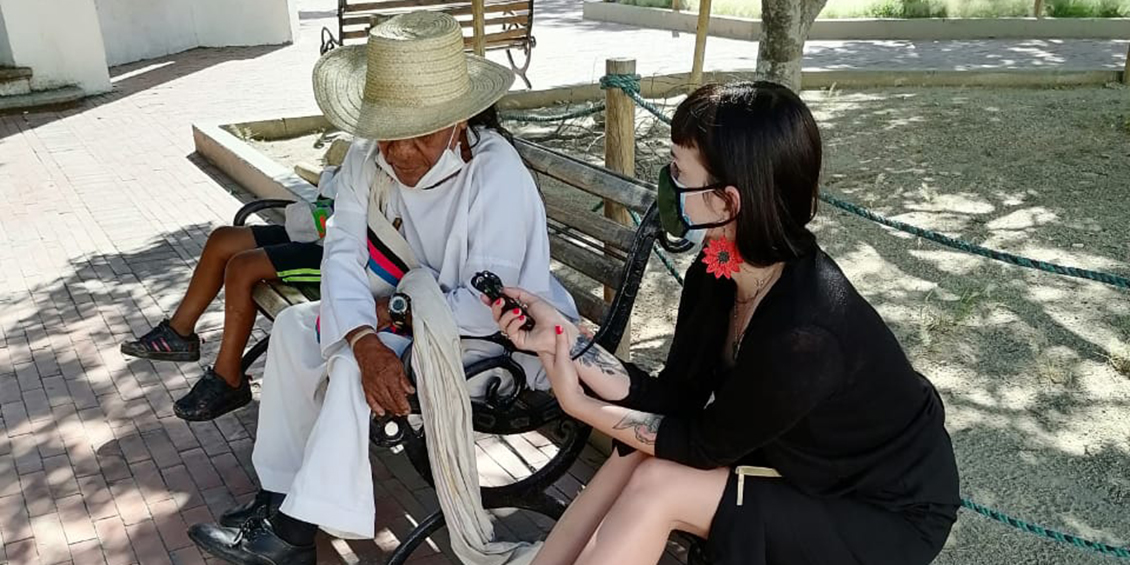The National University of Natural Medicine encourages you to take your education beyond the classroom with immersive international experiences that bring global health to life. Our travel courses provide the opportunity to work alongside local practitioners and organizations around the world—gaining firsthand insight into community health systems, traditional medicine, and the social determinants of health. These trips aren’t just about travel—they’re about transformation.
Who can participate?
Did you know that anyone is welcome to participate in these travel courses — current NUNM students from all programs, as well as other interested individuals? Non-NUNM students may be eligible to participate in International Travel Opportunities. Learn more about how to apply as a non-degree-seeking student.
Students in our online Master of Science in Global Health (MScGH) program are required to participate in at least one Global Health Experience course.
Trip fees include lodging, meals, in-country transportation and activities.
Travel Courses
These courses provide students with an opportunity to immerse themselves in a culture different from their own and gain tangible experience in global health settings.
GSN 839E – Croatia Culinary and Cultural Immersion Trip (4 Credits)
Upcoming Trip Dates: September 2026
In this course, students are immersed in the Mediterranean diet and culture of Croatia, one of only seven countries recognized by UNESCO as a carrier of the cultural heritage of this dietary pattern. Students will discuss the present-day benefits and challenges of this diet and examine what may be threatening its preservation. Local immersion includes exploring the most famous local food markets, visiting an olive grove and a vineyard, and traveling to the island of Hvar for a multi-day Mediterranean diet experience. Note: Itinerary-specific trip fee applies.
If you’d like to learn more about the trip, please email Zrinka Glavas at zglavas@nunm.edu.
GSGH 832E: Thailand Global Health Experience (4 credits)
Trip location: Chiang Mai, Thailand and surrounding areas
Upcoming trip dates: December 2026
On this cultural immersion trip, students’ study and experience culture, food and traditional medicine in Northern Thailand. Known for its temples, creative shops and incredible street food, Chiang Mai is a vibrant hub for both traditional medicine as well as modern healing arts. Students will have the opportunity to explore Thai herbal medicine, nutrition, cooking, Thai massage, bodywork, and how Buddhist practice influences health and psychology. While being based in Chiang Mai, we will take overnight excursions to the countryside where we will have the opportunity to learn about agriculture, self-reliance and indigenous life. This Global Health trip provides an experiential understanding of Thai culture, medicine and life through a sampling of traditions, activities and community experiences. Open to all students and all programs.
Each day starts with a morning lesson and experiential learning, and ends with an evening reflection. In between course content, students have time to sightsee. Located in the northwestern part of Thailand, Chiang Mai is known for its temples, creative shops, and incredible street food. In Chiang Mai, students will explore food as medicine, Thai physical medicine, and how spirituality influences Thai-veda.
If you’d like to learn more about the trip, please email Laura Scher at lscher@nunm.edu.
Optional Post-Trip Travel
From Chiang Mai, it’s easy to travel to Pai, Bangkok, the Thai islands, or Cambodia. If you wish to continue your Asian travels after the trip, you can explore the canals and Golden Buddha in Bangkok, the beaches of the Thai islands, or Angor Wat.
GSGH838E – India Global Health Experience (4 Credits)
Upcoming Trip Dates: December 2026
The India Global Health Experience Travel course offers a cultural immersion trip with an Ayurvedic doctor who was born, raised and familiar with India. Study, experience and examine India’s multiple options of medicine, e.g., Ayurveda, Yoga, Uniani, Siddha, Homeopathy, traditional medicines, tribal healthcare, their facilities, scheduling, insurance, taxations, challenges, pharmacies, rich culture, abundant food, cooking strategies, and shopping, etc. India is a diverse, ancient country. Our course destination Nashik is one of the five cities developed in the stone age and has the largest marketplace in the country then and now. It is also now for it vineyards and as the wine capital of India, which is considered equivalent to Napa Valley, CA. It is renowned for the medical education’s headquarter MUHS (Maharashtra University of Health Sciences), hospitals and pharmacies, its world heritage sites, temples, Ellora caves, textile, engineering and IT industries, incredible varieties of wine and street food, and vipassana meditation center. While being based in Nashik, we will take excursions to the countryside where we will have the opportunity to learn about tribal health, agriculture, organic farming, honeybee farming, self-reliance and indigenous life. This Global Health trip provides an experiential understanding of medicine, culture and life through sampling, study and community experiences with a Christmas Party in India with your class.
If you’d like to learn more about the trip, please email Savita Rajurkar at srajurkar@nunm.edu
Capstone I-II: Fieldwork Experience (GSGH 691, GSGH 692)
The Capstone I and II courses provide students with advanced practical experience in a global health-related local, national or international setting over an eight-to-ten-week period. This supervised experience allows students to apply the knowledge and skills they have acquired during their didactic training to a practice, research or policy-related project that incorporates a public health framework, systems approach, traditional medicine philosophy and cultural humility.
Students demonstrate program outcomes and competencies through the design and implementation of their fieldwork project, realization of their learning objectives, and the dissemination of a final product that benefits both the student and the host site.
Fieldwork projects involve diverse activities such as ethnographies, educational program development, secondary data analysis, environmental health assessment and community activism. Students can use their fieldwork projects as a launch point for future employment. Students find the fieldwork experience meaningful and often life changing.
GSGH 836E: Ghana Global Health Experience (6 credits)
Trip location: Accra, Ghana and surrounding areas
Upcoming trip dates: July 2026
Ghana is one of Africa’s fastest growing economies where large hospitals in the capital epitomize the impact of globalization, while rural villages live by centuries-old cultural traditions in resource-poor settings. This makes Ghana an ideal location for students to experience health care delivery first-hand. During the trip, students are fully immersed in the rich Ghanaian culture—from local cuisine to clinical observation. They participate in a variety of activities from hiking through jungles with local herbalists, to shadowing doctors and nurses in both urban hospital and rural clinic settings. Through these experiences, students gain a deeper understanding of how traditional medicine and biomedicine interrelate to influence local healthcare practices.
This course is primarily focused on clinical experiential learning and includes traditional West African herbal studies and cultural healing methods. In between course content, students have time to sight-see and participate in the rich culture. If you’d like to learn more about the trip, please email Dr. Tuson-Turner.
Optional Post-Trip Travel
From Accra, it’s easy to travel to Cape Coast, Kumasi, as well as other parts of West Africa. If you wish to continue your travels after the trip, you can explore the jungles and waterfalls of central Ghana, the beaches of the Gulf of Guinea, or go on safari in the country’s largest wildlife park, Mole National Park.
Faculty
Dr. Madeleine Tuson-Turner has lived and worked in Ghana since 2009. She has a deep love for Ghanaian culture and facilitating student experiences in various cultural settings. She is passionate about the ethics of global educational engagement, women’s health, reproductive health justice, and integrative medicine.

